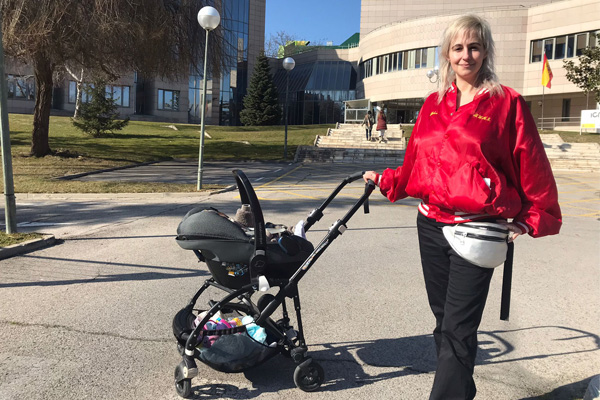Marta Carmona, psychiatrist: "We have normalized a way of life that crushes people"
Co-author of the book 'Malestamos' (Captain Swing, 2022), the psychiatrist has participated in the Colloquia cycle with an interesting talk about the social (and economic) conditions that make us feel bad (or not feel good).

Probably, if you have a look at your 'stickers' on WhatsApp, you'll find a large number of memes about 'dramas', 'crying', extreme fatigue, or other ways to try to humorously speak about a way of life that is not well, but it does not seem to be very bad either. It is a malaise, a place that is somewhat in between and difficult to name but where more and more people are found.
The psychiatrist Marta Carmona talks about that in the book that she co-writes with the family doctor Javier Padilla: 'Malestamos' (Captain Swing, 2022), which has the subtitle: "When being ill is a collective problem." She has also spoken about that this Monday in the Colloquia cycle of the Institute of Materials Science of Madrid (ICMM), CSIC, where almost a hundred people gathered to listen to what this woman had to say about mental health and community. On how to fix this.
Because almost everyone is talking about mental lately. But how do we do it? Why do we forget severe cases of psychiatric pathologies? The expert has warned of an extremely individualistic way of speaking about mental health: "From the most biologist or psychodynamic framework, or from any theoretical framework, the message is 'within me, there is something that has broken and I need an expert to help me, so come to fix it', and that perpetuates the individualist framework, when perhaps what is broken is the environment," she says.
For almost an hour she has shown these external conditions that make us feel bad, and that is not always solved with medication or psychotherapy. To express it, she imagines a time trip to a cotton plantation. Anyone can imagine that all people in a system of slavery could have symptoms of depression, but the solution to their situation is the abolition of slavery. "Of course, this is seen with several centuries of perspective, but today we are doing that with many things," she launches.
She uses some examples, starting with job insecurity, a fact that "there is no psychotherapy that will solve it for you." "We have normalized a way of life that crushes people," lamented the psychiatrist, who defends that we need "another framework and another context, and that is not being talked about." "Somehow, by talking so much about mental health from this very individual perspective and so much of a consumer product, the conditions in which psychotherapy is provided are being devalued, with an 'uberization' of that field," she added.
By enumerating the material (and economical) conditions that can make us -and, in fact, make us- feel bad, it may seem that her speech is pessimistic, but it is quite the opposite. The author and her partner defend that life can be much better: "We have a historical responsibility, this is the historical moment to decide what priorities we want in our future," she pointed out. In fact, she encourages thinking about 'co-care' along with so-called 'self-care' and calls for the claim of support within the community.
In sectors as competitive as science, despite acknowledging that it is complicated, she invites us to be optimistic: "The fact that it is difficult for us to think about what collective care is in this sector tells us that there is a gap in which we can work". And she adds: "Does it make sense that all people in the scientific career go to psychotherapy or do we have to change the system?" "We can already put 100,000 psychotherapists, but what needs to be done is that the scientific career is not a meat grinder, which right now is what it is. In addition, a meat grinder designed so that good (and rich) white guys can go through it unscathed", she points out.
In the end, a point of light: "There is a us supporting and supporting us, just as each one of us supports and supports others," she writes with Padilla in the book. "We can, we want to and we are going to be better", and we will do it with self-care, setting limits, but also, and this is essential, "demanding and building a better life for everyone" that goes through "recovering the speech".
-- Ángela R. Bonachera - Communication and Outreach Unit --
*Photo: Marta Carmona in front of the ICMM building with her daughter, who accompanied her during the day*
Instituto de Ciencia de Materiales de Madrid (ICMM)
Sor Juana Ines de la Cruz, 3
Cantoblanco, 28049
Madrid, España
Telephone: (+34) 91 334 90 00
Email: @email
Communication Office: @email

Acknowledge the Severo Ochoa Centres of Excellence program through Grant CEX2024-001445-S/ financiado por MICIU/AEI / 10.13039/501100011033

Contacto | Accesibilidad | Aviso legal | Política de Cookies | Protección de datos
